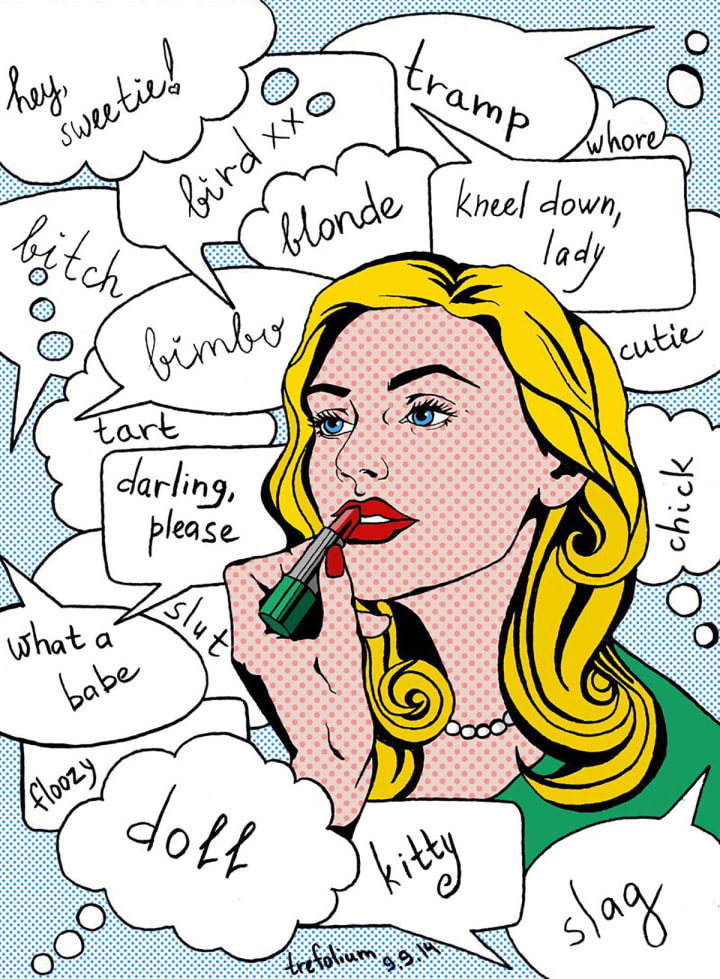Sexism in Language
Feminists fight to reduce sexism in language by reducing the number of gender-specific words.

Language is sexist. It has never met the equality needs of women. As gender issues move to the forefront of society's eye, it will continue to combat equality. A male-dominated language cannot meet the needs of those whose gender identities do not "fit" the bifurcated mold it perpetuates. Society must stop turning a blind eye to male-centric language and pronouns, and focus on speaking in a way that victimizes no one. But how do we edit a language that has been around for centuries?
The first step may be gender neutral pronouns. English, surprisingly enough, is the language that is the least bifurcated gender-wise. While he and she differentiate based on sex, they, you, and we are neutral. So why is it so difficult to grow this concept to cover third party pronouns as well? Whether you are an advocate of using they singularly or a gender neutral third party pronoun such as ze, a look at languages and how they discriminate makes it easy to see why this evolution is necessary. Charles F. Berlitz explored the sexism inherent in many languages and how we could remedy it in the below article, originally published in the July 1971 issue of Penthouse magazine
When Women's Lib adherents complain that everywhere the deck is stacked against them, they neglect to mention what they want us to do about the inbuilt discrimination of language. Dr. Benjamin Spock memorably faced the dilemma in the preface to his famous book of baby care: "Everywhere I've called the baby him. I think girl babies are as wonderful as boy babies. But in every sentence can't say 'her or him' and I can't say 'it.' " In those calmer times when his book was first published, Dr. Spock was content with a polite apology "I hope the parents of girls will understand and forgive me..."
Now that those girls are grown up and angry, however, they seem to be in no mood to understand and forgive various other facts of life, and it can only be a matter of time before the sheer inequality of language provokes them further. Will they then demand suitable variants for words like mankind, manhunt, and manpower? Will they fret at phrases like man the guns, man the lifeboats, or every man for himself, or will they concede that the use of the word man might be preserved in such essentially virile expressions?

Image via Deviant Art user Trefolium
Gender Pronouns
As it happens, English is capable of simple modifications on this front, but in many world languages—and isn't Women's Lib a World movement?—full equality would necessitate a basic change in language itself. For most of the world's languages are constructed with the feminine gender in a secondary role. Apart from English, European languages divide all nouns into masculine and feminine, or masculine, feminine, and neuter genders. In addition, Latin languages have separate words for the pronoun "they" according to whether it refers to men or women. From the time a French child, for example, begins to speak, he learns that there are two words for they—ils for males and elles for females. But suppose he wants to say they for girls and boys together? Then, he is told, he must use the masculine form, notwithstanding the relative sex representation of the group.
Suppose a sizable delegation of a French Women's Lib (La Liberation de la Femme), accompanied by one solitary male, organized a protest demonstration in the Place de la Bastille, French newspapers reporting the event would use the masculine form of ils to describe the protesters, because of the one man among the crowd of women. Before the feminine form elles could be used, the delegation would have to be 100 percent feminine, at least in gender.
This situation is even more striking in other Romance languages such as Italian, Spanish, and Portuguese, where the subject pronouns such as they, we, etc., are usually dropped from the verb form but gender remains evident in adjective or participle endings. So, if 500 women and the above solitary male are sitting or lying in protest in the Square, the word for "sitting" or "lying" would be masculine plural. Spanish even has two pronouns for we—nosotros for the masculine and nosotras for the feminine. However, as women are often in the company of men, nosotros becomes more natural to say, so much so that women frequently forget and use it even among and referring to themselves. Such is the force of machismo, a new "in" word seen in English these days, usually translated by everything except its basic meaning—maleness. Incidentally, Spanish used the interjection Hombre! (Man!) long before the beatniks and later the hippies established it as a recognition word in English. Spanish women use the word as a normal interjection, though logically when talking to each other they should say Mujer! (Woman!).
Linguistic Dominance
In Spanish the male linguistic dominance goes even further. The most polite way to refer to "Mr. and Mrs. Garcia," for example, would be el Señor Garcia y la Señora de García, literally "The Mr. Garcia and the Mrs. of Garcia"—the de (of) clearly showing who is the property of whom. Along with this possessiveness there exists a tendency to consider motherhood sacrosanct, with the curious reverse effect that the simple spoken words la madre (the mother), or tu madre (your mother) have become a great Spanish insult, representing a slur on the morals of one's mother. This super-insult, the trigger of deaths throughout the years, has so affected the Spanish psyche that people no longer use the word at all when they ask about a mother or her health. ''How is your mother?" must be expressed “Como esta su mama?” (literally “How is your mama?”) or “Como esta su señora madre?” (“How is your lady mother?"). To ask simply “Como esta su madre?” (or, even worse, tu madre, which would imply more familiarity) might elicit an unexpected answer in looks, words, or cold steel.
Describing Women
Women's Lib is obviously going to need a Revision Commission on World Languages and one of its first concerns should be the various words for wife. In Latin languages the word for woman is also the word for wife, though the word man is not synonymous with husband, which has a special word of its own. Thus, in French, Spanish, Italian, and Portuguese, a man can correctly refer to his wife as "my woman" (ma femme, mi mujer, mia moglie, minha musser, in that order), whereas a woman referring to her husband as "my man" would lend a raffish and vaguely immoral meaning to the reference.
French may be said linguistically to castigate the unmarried female. The word fille, which means both girl and daughter, is a curious example and care must be taken in its use. If you wish to specify girl, you must classify her as a young girl (jeune fille), young lady (demoiselle), or daughter (ma fille), for if you say simply "a girl" (une fille) you are implying that she is a girl of no account or a prostitute. Again there is a separate word for boy (garcon), and son (fils), making French, internationally famous as the language of politeness, semantically loaded against women.
There also seems to be an application of the double standard in French in the word amour (love). Amour, when singular, is masculine, but in the plural, it becomes feminine; perhaps a Gallic suggestion that a woman should love only one man but a man may have as many loves as he wishes.
On the other side of the world, though, old Chinese custom reputedly kept women in a state of bondage. The Chinese language traditionally used some of the most charming descriptive words for women as references or as forms of direct address. For example, when talking to or referring to another person's wife, one used to use tai-tai, literally "very very" or "excessive excessive," referring to her superior qualities of grace and beauty, while one referred to one's own wife as neo-jen (the inside person), indicating thereby where one's wife should be. The polite Chinese would refer to another person's daughter as chien-chih (the thousand pieces of gold), to another person's mother as ling-tang, literally "August hall"—combining at one fell swoop the qualities of stability, hospitality, reverence, and permanence. These allusive honorifics are no longer in fashion on the Chinese mainland where both men and women now share the egalitarian title of "comrade"—tung-chih, meaning both "same view" and "think alike."

Artwork by Alice Meichi Li
Sexism in Writing
Chinese is a language without gender, and with the same word for he and she. So at first sight, Chinese might seem a logical albeit complicated choice for a Women's Lib unisex tongue. But Chinese reveals itself to be anti-female in its age-old system of picture writing or ideographs. The combination of the sign for woman with other signs to make different words indicates a pragmatic view of the opposite sex. The sign for one woman under a roof, for example, means peace, three women means licentiousness, debauchery, or fornication, while a woman combined with the character for "a thousand" means treacherous. A woman and a child together mean good and a woman alongside a pig under a roof means marriage (the pig standing for riches—not the husband, naturally). A woman combined with a big eye means envy, while a woman peeking around a door is jealousy. The combination of a woman and a mouth means if or supposing—this last being perhaps the most astutely reflective one of all.
Fairness Through Complexity
At the other end of the semantic spectrum are the sexually preoccupied, if not obsessed, Semitic languages. Arabic and Hebrew are linguistic cousins in this family group. In these languages, not only are all nouns masculine or feminine, with which the modifying adjectives must agree in gender, but the verb itself must show the gender of the subject. If, for example, you were to express that you were giving something to someone, such as "I give it to you," you would have to consider, grammatically, whether the "someone" were male or female, the gender of the thing being given and of course, your own gender. In other words, six possibilities exist for the same simple statement, all based on gender. Even to say "I love you" has four possibilities, based on whether you, a man, love a woman or you, a woman, love a man, or you, a man, love another man; or you, a woman, love another woman. Elaborate, but not even Women's Lib could complain of unfair discrimination.
Russian, incidentally, has a curious survival whereby the sex of the speaker is evident only in the past tense of the verb but not in the present or future.

Image via MemeCenter
Manly and Womanly Words
Even English, however, possesses many distinctly womanly words which most men would hesitate to use, for example darling, adorable, etc., used as everyday adjectives. Women, traditionally, have been supposed to avoid man-type language of the army and other virile pursuits, though the last few years have modified this attitude considerably. Some languages carry man and woman words even further. In Japanese the general word for I is watakushi, but women wishing to be ultra-feminine will often say watashi, while men, in the warrior spirit of the Samurai, will use a completely different word, boku. But such is the breakdown of the sexes that modern Japanese girls have taken to using the male warrior term instead of the simpering watashi.
Among many tribes—American Indians, Africans, South Sea Islanders, and Eskimos—all sorts of linguistic taboos exist whereby women cannot mention words describing articles dedicated to men's use, such as things used in war or the hunt, nor must men use women's words referring to cooking and other domestic pursuits. When such things must be referred to, women will use an allusive women's word for men's things and men will coin a special word for men to use for women's things. The Mazateco Indians of Mexico have a whistled secret language in which the length of the whistled syllable corresponds to the word. This language is used only by men and if a woman were to copy it her reputation would suffer. Among some Eskimos the women, by usage, transform the "p" and "kg" sounds of their language into "m" and "n." For reasons yet unclear, it has been noted that within the present generation some Eskimo men have taken to imitating the women in this peculiarity.
Perhaps the sex differences of languages have never been so graphically illustrated as in the final warfare between the Arawak Indians and the Caribs, which occurred in the Caribbean some hundreds of years ago. The Caribs, as victors, ate the male Arawaks and took the more comely Arawak females to their hammocks (hammock itself is a word of Carib origin). These Arawak women taught their ensuing children to speak Arawak, though the children learned Carib to speak to their fathers. Arawak survived for generations as a secret woman-children language never to be spoken before the warrior Caribs. History has seldom recorded such an incisive incident of language divisiveness based on sex.
It may console our Women's Liberationists that of the world's truly international languages, English is the least preoccupied with gender. It does differentiate between he and she but there is only one word for we, you, and they. Anything without an obvious gender is referred to as it. The only time that feminine gender, so important to most of the other languages, seems to intrude is in the case of locomotives, ships, and other large pieces of machinery, usually referred to as she. Come to think of it, it's a vaguely derogatory custom, and it's a wonder Women's Lib hasn't objected. Anyway, it could probably be cleared up by linguistic reform, making English the most serviceable vehicle for International Women's Lib.
The whole idea of gender in language, it must be admitted, is archaic and confusing. It makes languages difficult to learn, since you must constantly keep the gender in mind so that you use the right article as well as the proper form of the adjective. In addition it is often logical—why should das Mädchen (girl) and Fräulein (miss, or young lady) be neuter in German, instead of feminine? Why should the Sun be masculine and the Moon feminine in most languages but reversed in German? Sometimes a thing will even change its gender through the years—the word automobile started out in French as feminine and now it is masculine. And what about the words for women's sexual organs, masculine in gender, while those of the man are feminine? Or the supreme illogic that puts the word for vagina into masculine in French (se vagin) but feminine in Spanish (la vagina)?
Animals present another linguistic problem in French. Among the larger animals the males are masculine nouns and the females feminine, but in the smaller animals such as the frog (la grenouille) the word itself is feminine. So, in the unlikely event that you wish to specify a male frog you would have to say la grenouille male, in other words "the (female) frog male." According to the same logic, the female rat would be se rat femelle—"the (masculine) rat female."
Perhaps the future development of language will eventually overcome these anomalies by a gradual abolition of gender. But language, like biology, is slow to change. It's an evolutionary process, restrained by the power of custom, for people cherish their languages along with all their inconsistencies as part of their personal and national identities. If language discriminates it is because sex itself discriminates—language merely reflects the differences.
About the Creator
Filthy Staff
A group of inappropriate, unconventional & disruptive professionals. Some are women, some are men, some are straight, some are gay. All are Filthy.






Comments
There are no comments for this story
Be the first to respond and start the conversation.